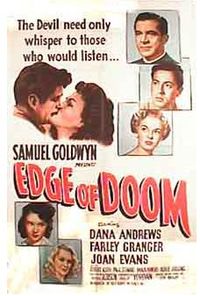
EDGE OF DOOM
US, 1950, 99 minutes, Black and white.
Dana Andrews, Farley Granger, Joan Evans, Robert Keith, Mala Powers, Adele Jurgens, Paul Stewart.
Directed by Mark Robson.
A moderately interesting melodrama with Catholic religious themes. However, it is fairly didactic in its presentation, especially in the story as told by Dana Andrews as Father Roth to persuade a curate to stay in a difficult parish. The screenplay is by Phillip Yordan, a prolific screen writer of the forties and fifties.
Produced by Samuel Goldwyn, it is directed by Mark Robson - who made several horror films and then a wide range of dramas in the early fifties until he moved to big budgeted films like Peyton Place and From the Terrace in the late fifties and through the sixties into the seventies. Farley Granger is required to act yet again as a disturbed young man as he did in Hitchcock's Rope. Of interest to see how Hollywood regarded priests and the Catholic church around 1950.
1. How interesting and entertaining a melodrama, crime story, urban story, Catholic religious film? The significance of the title?
2. The didactic tone of the film, the story of Martin Lynn as a parable? Father Roth's preaching? The structure of the film with Father Roth's story and comments, the building up of the story of Martin Lynn as seen by Father Roth and as commented on morally by him?
3. The black and white photography, the strident score? The urban atmosphere and the poor parish, the religious background with the Catholic church itself, the presbytery? how authentic? The Catholic church as seen by Hollywood in 1950?
4. Dana Andrews' style as Father Roth? His talk and explanation of himself to Father George? The interaction with Father Kirkman and Father Kirkman's praise of his capacity to understand people? Seeing him at work in the various people who telephoned, asked his help, for example neglected wives, mothers with sons in prison? The good that he was able to do? His attitude towards God and religion? His style of helping people? His helping Father Kirkman with his niece Rita? His continued interest in Martin and his knowing that he was guilty, his presence at the funeral parlour and helping him at the end? How persuasive was his story?
5. The contrast with Father Kirkman and his being forty years in the presbytery, his impatience, getting people to wait? His lack of ability to relate to people? His comments to Father Roth about this? His deafness, the encounter with Martin, his attitude towards his mother, Martin's father and the Catholic Church not burying a suicide? The talk about the funeral, his hard attitude, money for the taxi, his death? The pathos of a priest dying like this?
6. How well was the character of Martin revealed and explored? By Father Roth's commentary? his father's illness and suicide and lack of Catholic burial, his mother and her illness and dying without the sacraments? His working for the florist? An intense and earnest young man, his needing a raise, his dreams of sending his mother to Arizona? The encounter with the neighbours about his mother's illness, calling the priest? Arranging the funeral? Discussions with Craig? His love for Julie and her inability to help? The intensity of the love for his mother and its motivation, his anger and resentment especially against the church, Father Kirkman's manner and provoking him to kill him? His behaviour afterwards especially eating, his anxiety in the washroom, the detectives and the interrogation about the theatre robbery? His clash with the manager of the florists? His clash with Mr Murray and Murray's secretary? The growing anguish, deceit, physical pain? His participation in the line-up and the irony of Craig's being identified?
7. How persuasively was his fear and anguish portrayed? His desperation in finally going to Julie and wanting her to leave him, going to his mother and his speaking aloud to her and Father Roth's hearing? His saying of the name of God at the end?
8. The portrait of American city life around 1950, the tenements, poverty, a hard neighbourhood and a hard parish? The portrait of Craig and his robbery, his girl friend?
9. The portrait of the police, the detectives and their work, Mandel and his interrogations and hunches?
10. Themes of the Catholic church and its support of people, the personalities of the priests with their limitations? Questions of money and poverty? The possibility of resentment and anger against the church?
11. How interesting a crime and religious film? Moralizing?